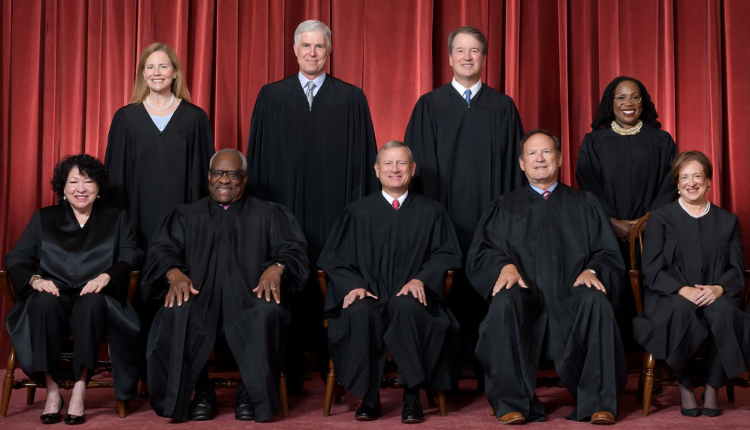Chief justice turns down invitation to testify about SCOTUS ethics reform in Congress

The U.S. Supreme Court as composed June 30, 2022, to present. Photo by Fred Schilling via the Supreme Court website.
Chief Justice John Roberts told the chairman of the Senate Judiciary Committee on Tuesday that he “must respectfully decline” an invitation to testify about ethics reform regarding the U.S. Supreme Court.
“Testimony before the Senate Judiciary Committee by the chief justice of the United States is exceedingly rare, as one might expect in light of separation of powers concerns and the importance of preserving judicial independence,” wrote Roberts in an April 25 letter.
Law.com, Law360, Reuters and the Washington Post are among the publications with coverage.
Chief justices have only testified twice in Congress about matters other than appropriations and nominations—in 1921 and 1935, Roberts said.
“Both hearings involved routine matters of judicial administration,” Roberts wrote.
Supreme Court justices agreed in 1991 to follow the substance of regulations regarding financial disclosures, gifts and outside income that have been adopted by the U.S. Judicial Conference, Roberts said in a “Statement on Ethics Principles and Practices” that he attached to his letter. The Judicial Conference governs lower federal courts.
All current Supreme Court justices abide by the Statement on Ethics Principles and Practices, Roberts said.
U.S. Sen. Dick Durbin, a Democrat from Illinois and chairman of the Senate Judiciary Committee, had invited Roberts to testify May 2 as part of “a new public conversation on ways to restore confidence in the court’s ethical standards.”
The invitation followed revelations by ProPublica that Justice Clarence Thomas had accepted luxury vacations from his friend, billionaire Republican megadonor Harlan Crow. Crow also purchased a home and two vacant lots that were partly owned by Thomas.
Politico reported Tuesday that Greenberg Traurig CEO Brian Duffy bought property in which Justice Neil Gorsuch held an interest. Gorsuch disclosed income from the company that owned the property but not the buyer.
Durbin responded in a statement cited by the Washington Post.
“I am surprised that the chief justice’s recounting of existing legal standards of ethics suggests current law is adequate and ignores the obvious,” Durbin said. “It is time for Congress to accept its responsibility to establish an enforceable code of ethics for the Supreme Court, the only agency of our government without it.”
Gabe Roth, executive director of Fix the Court, a court transparency group, also released a statement.
“Chief Justice Roberts’ statement is nowhere near an appropriate response to the ethical failures of the current court,” Roth said. “Roberts here is demonstrating a profound ineptitude to rise to the occasion, and our country is worse for it.”
See also:
ABA Journal: “A binding code of ethics for SCOTUS justices is needed to protect the court’s credibility, delegates say”
ABAJournal.com: “Nearly 20 years ago, Scalia explained why he didn’t consider jet trip a gift”
Write a letter to the editor, share a story tip or update, or report an error.



